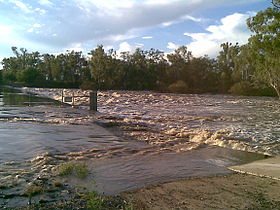
Carnarvon National Park is located in the Southern Brigalow Belt bioregion in the Maranoa Region in Central Queensland, Australia. The park is 593 km northwest of Brisbane. It began life as a 26,304-hectare (65,000-acre) reserve gazetted in 1932 to protect Carnarvon Gorge for its outstanding scenic values, its Indigenous and non-Indigenous cultural heritage, and its geological significance.

Isla Gorge is a national park in Queensland, Australia, 415 km northwest of Brisbane, gazetted in 1964. It contains a rest area with toilets and a camping area, situated along the Leichhardt Highway just south of Theodore.

The Fitzroy River is a river in Central Queensland, Australia. Its catchment covers an area of 142,665 square kilometres (55,083 sq mi), making it the largest river catchment flowing to the eastern coast of Australia. It is also the largest river basin that discharges onto the Great Barrier Reef.
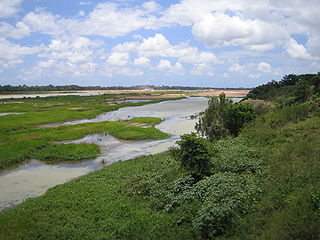
The Burdekin River is a river in North and Far North Queensland, Australia. The river rises on the northern slopes of Boulder Mountain at Valley of Lagoons, part of the western slope of the Seaview Range, and flows into the Coral Sea at Upstart Bay over 200 kilometres (124 mi) to the southeast of the source, with a catchment area of approximately 130,000 square kilometres (50,000 sq mi). The Burdekin River is Australia's largest river by (peak) discharge volume.

Central Queensland is an imprecisely-defined geographical division of Queensland that centres on the eastern coast, around the Tropic of Capricorn. Its major regional centre is Rockhampton. The region extends from the Capricorn Coast west to the Central Highlands at Emerald, north to the Mackay Regional Council southern boundary, and south to Gladstone. The region is also known as Capricornia. It is one of Australia's main coal exporting regions.

The Leichhardt Highway is a major transport route in Queensland, Australia. It is a continuation northward from Goondiwindi of the Newell Highway, via a 2.0-kilometre (1.2 mi) section of the Cunningham Highway.

Theodore is a rural town and locality in the Shire of Banana, Queensland, Australia. In the 2016 census the locality of Theodore had a population of 438 people.

Carnarvon Gorge is located in the Southern Brigalow Belt bioregion in Central Queensland (Australia), 593 km northwest of Brisbane. Primarily created by water erosion, Carnarvon Gorge is around 30 kilometres long, located in Carnarvon National Park, and six hundred metres deep at the mouth. It is the most visited feature within Carnarvon National Park due to the diversity of experiences it contains and the ease with which it can be accessed. The closest towns are Injune and Rolleston.
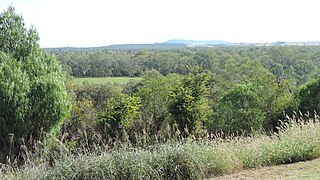
Taroom is a town in the Shire of Banana and locality split between the Shire of Banana and the Western Downs Region in Queensland, Australia. At the 2016 census, Taroom had a population of 869 people.
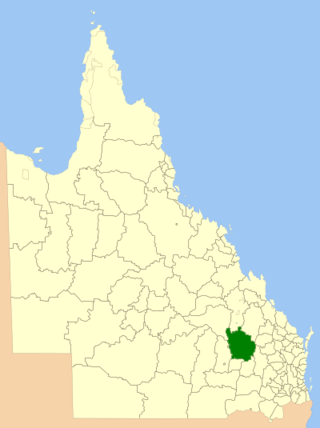
The Shire of Taroom was a local government area in the Darling Downs region of Queensland, Australia, along the Leichhardt Highway to the north of Miles. The shire covered an area of 18,644.5 square kilometres (7,198.7 sq mi), and existed as a local government area from 1879 until 2008, when it was dissolved and split between the new Western Downs Region and the Shire of Banana.
The Hornet Bank massacre was the killing of eleven British settlers, which included eight members of the Fraser family, by a group of mostly Yiman Indigenous Australians. The massacre occurred at about one or two o'clock in the morning of 27 October 1857 at Hornet Bank station on the upper Dawson River near Eurombah in central Queensland, Australia. It has been moderately estimated that 150 Aboriginal people succumbed in subsequent punitive expeditions conducted by Native Police, private settler militias, and by William Fraser in or around Eurombah district. Indiscriminate shootings of "over 300" Aboriginal men, women, and children, however, were reportedly conducted by private punitive expedition some 400 kilometres eastward at various stations in the Wide Bay district alone. The result was the near-extermination of the entire Yiman tribe and language group by 1858; this claim was disputed, however, and descendants of this group have recently been recognised by the High Court of Australia to be the original custodians of the land surrounding the town of Taroom.

The Maranoa River, part of the Murray-Darling basin, is a river situated in South West Queensland, Australia.

The Carnarvon Range is a mountain range in Central Queensland, Australia. It is a plateau section of the Great Dividing Range. The Carnarvon Range is 160 km in length.
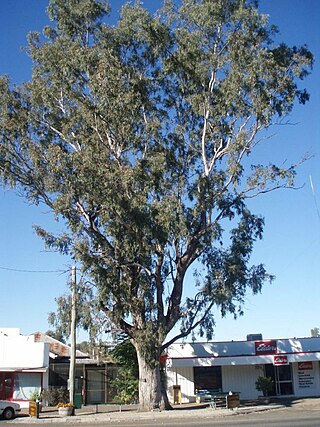
Leichhardt Tree is a heritage-listed blazed tree at Yaldwyn Street, Taroom, Shire of Banana, Queensland, Australia. The blaze was made in 1844 by Ludwig Leichhardt. It was added to the Queensland Heritage Register on 21 October 1992.
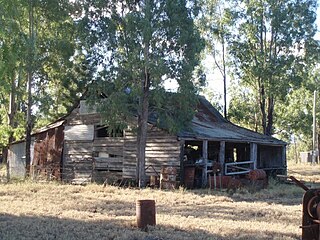
Glebe is a rural locality in the Shire of Banana, Queensland, Australia. In the 2016 census Glebe had a population of 24 people.
The Yiman, also known as Yeeman, Eoman or Jiman, and by themselves in modern times as Iman, are an Aboriginal Australian people living in the Upper Dawson River region around Taroom of eastern Central Queensland.

The Fitzroy Developmental Road is a designated road in the Central Highlands Region of Queensland consisting of three separate sections. The general direction is from south to north.
The Leichhardt Way is an Australian road route from Melbourne, Victoria to Rockhampton in Queensland. It has been designated by the Queensland Government as a State Strategic Touring Route.
Spring Creek is a rural locality in the Shire of Banana, Queensland, Australia. In the 2016 census Spring Creek had a population of 15 people.
Eidsvold–Theodore Road is a continuous 143.7 kilometres (89.3 mi) road route in the North Burnett and Banana regions of Queensland, Australia. The entire route is signed as State Route 73. It is a state-controlled district road rated as a local road of regional significance.
